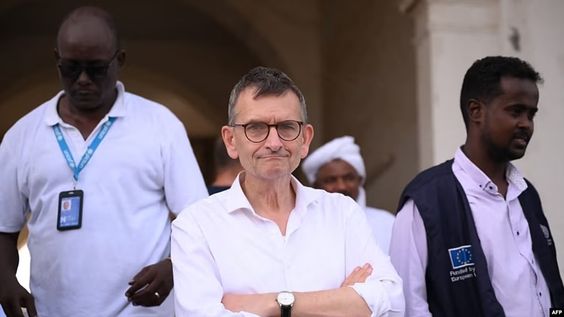Africa
Sudanese Army Chief Wants UN Envoy Fired, Claims He Fueled Conflict

General Abdel-Fattah Burhan, the head of the Sudanese army, has claimed that Volker Perthes, a U.N. special envoy, has incited a bloody battle with paramilitaries. This accusation is the most recent in a string of actions that seem to be designed to support his war effort.
Antonio Guterres, the secretary-general of the United Nations, expressed his shock at Burhan’s letter, in which he demanded “the nomination of a replacement” for Perthes and charged him with “fraud and disinformation” for facilitating a political process that degenerated into six weeks of devastation-inducing urban warfare. According to Guterres, he was “proud of the work done by Volker Perthes and reaffirms his full confidence in his Special Representative.”
On April 15, the day they transformed Khartoum into a war zone, Burhan and General Mohamed Hamdan Dagalo, his former deputy and the commander of the paramilitary Rapid Support Forces, were scheduled to meet for discussions brokered by the U.N.
The goal of the gathering was to repair the breakdown in the transition to civilian administration that occurred in 2021 when Burhan and Dagalo together overthrew the government in a coup before quarrelling. The world community sought to persuade them to come to an agreement about the integration of Dagalo’s RSF into the regular army as their conflict became worse.
Since late last year, hundreds of military and Islamist sympathizers have protested against Perthes and the U.N. mission in Sudan, which he leads, accusing them of foreign interference and calling for their resignation.
Since the conflict began, similar demonstrations have occurred in Port Sudan, a city in the east.
Perthes remained upbeat and said that the conflict caught him off guard.
Burhan said in the letter that Perthes had given a false impression of agreement in his reports to the U.N. and that “without these signs of encouragement, the rebel leader Dagalo would not have launched his military operations.”
Who fired the first rounds has not been able to be confirmed.
According to the Armed Conflict Location and Event Data Project, more than 1,800 individuals have died in fighting throughout Sudan.
According to the UN, in addition to the 319,000 refugees who fled to nearby countries, more than a million people have been displaced inside Sudan, creating worries for regional peace.
A one-week cease-fire that was mediated by the United States and Saudi Arabia ends Monday night.
Last Monday, Burhan formally removed Dagalo from his position as his deputy in the Sovereign Council, appointing Malik Agar in his place.
But even after hearing of Burhan’s letter, Agar claimed he had spoken to Perthes about “ways to resolve the crisis and end the war.”
Perthes is in New York right now, and on Monday he gave the Security Council a briefing on Sudan. The two generals at war are to blame, he said in response to those who “accuse the U.N.”
Perthes “may not be allowed back into Sudan,” claims Sudanese analyst Kholood Khair, head of the Khartoum-based think firm Confluence Advisory.
His visa would serve as a barometer to determine the Islamists’ revival, she said on Twitter.
Pro-democracy activists have long charged Burhan of serving as a chariot for Islamists from the Omar al-Bashir administration, which the military overthrew in 2019 after protracted demonstrations.
Since the coup, a number of senior Bashir government figures have taken up new responsibilities in Burhan’s administration.
Throughout the conflict, Burhan’s support has become more obvious, including “a web of crony-capitalist corporations, from banks and telecom companies owned by Islamists and intelligence officers to companies owned by the military itself,” according to Sudan specialist Alex de Waal.
Burhan has been referred to by Dagalo himself as a “Islamist” and a “coup plotter” who wants to restore “the remnants of the old regime.”
Dagalo has connections to gold mines, and de Waal has said that he has prospered in a setting “where money and guns determine everything.” His RSF are descended from the deadly Janjaweed militia that Bashir unleashed in Darfur.
